
In Greco-Roman mythology, Aeneas was a Trojan hero, the son of the Trojan prince Anchises and the Greek goddess Aphrodite. His father was a first cousin of King Priam of Troy, making Aeneas a second cousin to Priam's children. He is a minor character in Greek mythology and is mentioned in Homer's Iliad. Aeneas receives full treatment in Roman mythology, most extensively in Virgil's Aeneid, where he is cast as an ancestor of Romulus and Remus. He became the first true hero of Rome. Snorri Sturluson identifies him with the Norse god Víðarr of the Æsir.

Publius Vergilius Maro, usually called Virgil or Vergil in English, was an ancient Roman poet of the Augustan period. He composed three of the most famous poems in Latin literature: the Eclogues, the Georgics, and the epic Aeneid. A number of minor poems, collected in the Appendix Vergiliana, were attributed to him in ancient times, but modern scholars consider his authorship of these poems to be dubious.
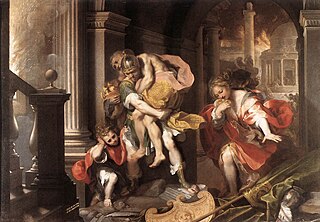
The Aeneid is a Latin epic poem that tells the legendary story of Aeneas, a Trojan who fled the fall of Troy and travelled to Italy, where he became the ancestor of the Romans. Written by the Roman poet Virgil between 29 and 19 BC, the Aeneid comprises 9,896 lines in dactylic hexameter. The first six of the poem's twelve books tell the story of Aeneas' wanderings from Troy to Italy, and the poem's second half tells of the Trojans' ultimately victorious war upon the Latins, under whose name Aeneas and his Trojan followers are destined to be subsumed.

The founding of Rome is a legendary event much embellished by later Roman myth. Archaeological evidence indicates that Rome was developed from earlier hilltop villages and was never so singularly founded. Habitation of the Italian peninsula goes back far into prehistory; evidence of settlement on the Capitoline hill goes back to 1700–1350 BC, in line with more general archaeological evidence of settled habitation c. 1600 BC. Evidence of graves on the site goes back to 1000 BC. Likely influenced by a trend for city-state formation emerging from Greece, these hilltop settlements agglomerated into a single polity by the later eighth century BC.
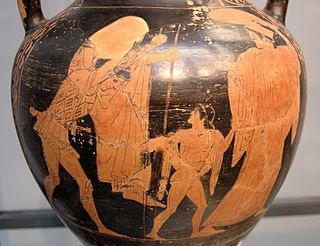
Ascanius was a legendary king of Alba Longa and is the son of the Trojan hero Aeneas and Creusa, daughter of Priam. He is a character in Roman mythology, and has a divine lineage, being the son of Aeneas, who is the son of the goddess Venus and the hero Anchises, a relative of the king Priam; thus Ascanius has divine ascendents by both parents, being descendants of god Jupiter and Dardanus. He is also an ancestor of Romulus, Remus and the Gens Julia. Together with his father, he is a major character in Virgil's Aeneid, and he is depicted as one of the founders of the Roman race.
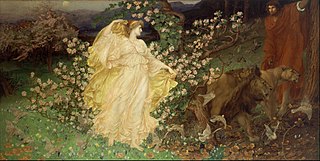
Anchises was a member of the royal family of Troy in Greek and Roman legend. He was said to have been the son of King Capys of Dardania and Themiste, daughter of Ilus, who was son of Tros. He is most famous as the father of Aeneas and for his treatment in Virgil's Aeneid. Anchises' brother was Acoetes, father of the priest Laocoön.

Dido, also known as Elissa, was the legendary founder and first queen of the Phoenician city-state of Carthage, in 814 BC. In most accounts, she was the queen of the Phoenician city-state of Tyre who fled tyranny to found her own city in northwest Africa. Known only through ancient Greek and Roman sources, all of which were written well after Carthage's founding, her historicity remains uncertain. The oldest references to Dido are attributed to Timaeus, who was active around 300 BC, or about five centuries after the date given for the foundation of Carthage.
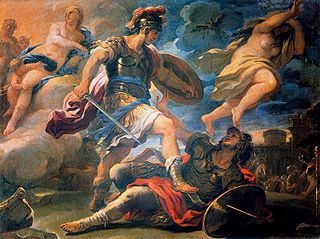
Turnus was the legendary King of the Rutuli in Roman history, and the chief antagonist of the hero Aeneas in Virgil's Aeneid.
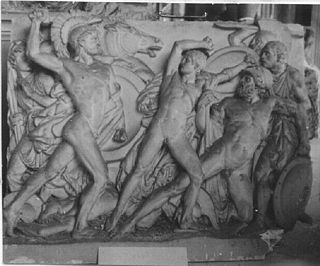
In Roman mythology, Mezentius was an Etruscan king, and father of Lausus. Sent into exile because of his cruelty, he moved to Latium. He reveled in bloodshed and was overwhelmingly savage on the battlefield, but more significantly to a Roman audience he was a contemptor divum, a "despiser of the gods."

Dido and Aeneas is an opera in a prologue and three acts, written by the English Baroque composer Henry Purcell with a libretto by Nahum Tate. The dates of the composition and first performance of the opera are uncertain. It was composed no later than July 1688, and had been performed at Josias Priest's girls' school in London by the end of 1689. Some scholars argue for a date of composition as early as 1683. The story is based on Book IV of Virgil's Aeneid. It recounts the love of Dido, Queen of Carthage, for the Trojan hero Aeneas, and her despair when he abandons her. A monumental work in Baroque opera, Dido and Aeneas is remembered as one of Purcell's foremost theatrical works. It was also Purcell's only true opera, as well as his only all-sung dramatic work. One of the earliest known English operas, it owes much to John Blow's Venus and Adonis, both in structure and in overall effect.
Damias is a genus of moths in the family Erebidae. The genus was erected by Jean Baptiste Boisduval in 1832.
Mallomus is a genus of moths in the family Geometridae.
Xyroptila is a genus of moths in the family Pterophoridae.
Aenigmina critheis is a moth of the family Sesiidae. It is known from Mozambique.
Aenigmina latimargo is a moth of the family Sesiidae. It is known from Tanzania.
Minacraga is a genus of moths of the family Dalceridae.
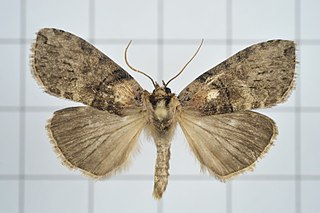
Horipsestis aenea is a moth in the family Drepanidae. It was described by Wileman in 1911. It is found in Taiwan, the Chinese provinces of Henan, Shaanxi, Gansu, Hubei, Jiangxi, Hunan, Fujian, Guangxi, Hainan, Sichuan and Yunnan and in Vietnam.
Eneide is a seven-episode 1971–1972 Italian television drama, adapted by Franco Rossi from Virgil's epic poem the Aeneid. It stars Giulio Brogi as Aeneas and Olga Karlatos as Dido, and also stars Alessandro Haber, Andrea Giordana and Marilù Tolo. RAI originally broadcast the hour-long episodes from 19 December 1971 to 30 January 1972. A shorter theatrical version was released in 1974 as Le avventure di Enea.










